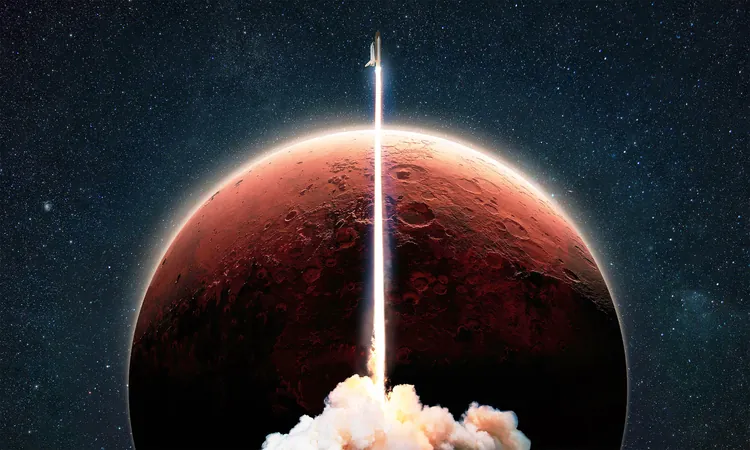
Astronauts Face Kidney Challenges on Mars Missions - What You Need to Know
2025-03-29
Author: Ling
Introduction
As humanity sets its sights on Mars, exciting yet daunting questions arise about how the human body will cope during prolonged space voyages. While we have made remarkable strides in our understanding of space travel, recent research uncovers a troubling aspect of astronaut health: the kidneys.
Research Findings
New studies indicate that astronauts may encounter more significant risks related to kidney health during their journeys than previously anticipated. Researchers have highlighted the potential for increased kidney stones and lasting damage due to cosmic conditions encountered in space.
Dr. Keith Siew from the London Tubular Centre, along with a global team spanning over 40 research institutions, delved into the effects of spaceflight on kidney function. Their comprehensive investigation involved data from 20 different cohorts, encompassing more than 40 missions to the International Space Station along with several simulations on rodents exposed to conditions simulating long-term space travel.
Impact of Galactic Radiation
This monumental research, the largest of its kind regarding kidney health in space, has provided crucial insights into the structural and functional changes that occur in kidneys during space missions. The toll of galactic radiation was particularly concerning, revealing that it can cause pervasive damage to kidney cells, threatening the health and safety of astronauts on longer missions like those projected for Mars.
One startling discovery showed that critical kidney tubules that regulate minerals shrink significantly after just one month in microgravity, increasing the risk of kidney stones. This shifts the previous understanding, which suggested that kidney stone formation in space was primarily due to reduced bone density and subsequent calcium release into urine.
Long-Term Risks
As researchers examined the effects of simulated Galactic Cosmic Radiation—akin to what astronauts would face during extended missions—it became evident that certain kidney functions are severely impacted, leading to irreversible damage that poses serious risks for crewmembers on long-term voyages. Presently, only 24 humans have experienced brief exposure to full galactic radiation during moon missions, but the consequences for those embarking on months-long missions remain an open question.
Dr. Siew articulated the urgency of these findings, stating that given the kidneys are slow to exhibit signs of radiation damage, potential failure may manifest too late to be addressed adequately during a mission. This raises grave concerns—astronauts might require dialysis either during their return journey or upon arrival on Mars.
Extending Research and Solutions
Space missions' health risks have long been a topic of interest for agencies since the 1970s, especially concerning bones, eyesight, and cardiovascular health. This recent research underscores the kidneys' vulnerability and reveals an urgent necessity to address radiation exposure and microgravity effects proactively as we embark on bolder missions.
Prof. Stephen B. Walsh adds that while conventional shielding fails to protect kidneys from radiation, advancements in understanding renal biology may pave the way for innovative medical solutions. Such developments could even have benefits here on Earth, possibly enabling cancer patients to endure more intense radiotherapy regimens.
Conclusion
In conclusion, this research illuminates a crucial area of inquiry as we prepare for the first human settlements on Mars. Protecting astronauts’ kidney health will be paramount, not only for their safety but also for the success of future missions. With ongoing international collaboration and vast potential for scientific breakthroughs, the future of space exploration looks promising, albeit challenging.
Stay tuned as we continue to monitor these developments and their implications for astronaut health in the pursuit of interplanetary travel!



 Brasil (PT)
Brasil (PT)
 Canada (EN)
Canada (EN)
 Chile (ES)
Chile (ES)
 Česko (CS)
Česko (CS)
 대한민국 (KO)
대한민국 (KO)
 España (ES)
España (ES)
 France (FR)
France (FR)
 Hong Kong (EN)
Hong Kong (EN)
 Italia (IT)
Italia (IT)
 日本 (JA)
日本 (JA)
 Magyarország (HU)
Magyarország (HU)
 Norge (NO)
Norge (NO)
 Polska (PL)
Polska (PL)
 Schweiz (DE)
Schweiz (DE)
 Singapore (EN)
Singapore (EN)
 Sverige (SV)
Sverige (SV)
 Suomi (FI)
Suomi (FI)
 Türkiye (TR)
Türkiye (TR)
 الإمارات العربية المتحدة (AR)
الإمارات العربية المتحدة (AR)